Open broadcast of the main hall HighLoad ++ 2018
The conference for developers of high-loaded services HighLoad ++ this year turned out to be just gigantic. On November 8 and 9, 3000 guests will come to SKOLKOVO to understand the intricacies of architecture, learn about innovations in databases, talk about microservices, clouds, big data, neurons and who knows what other jungle conversations all these top-notch developers can go into.
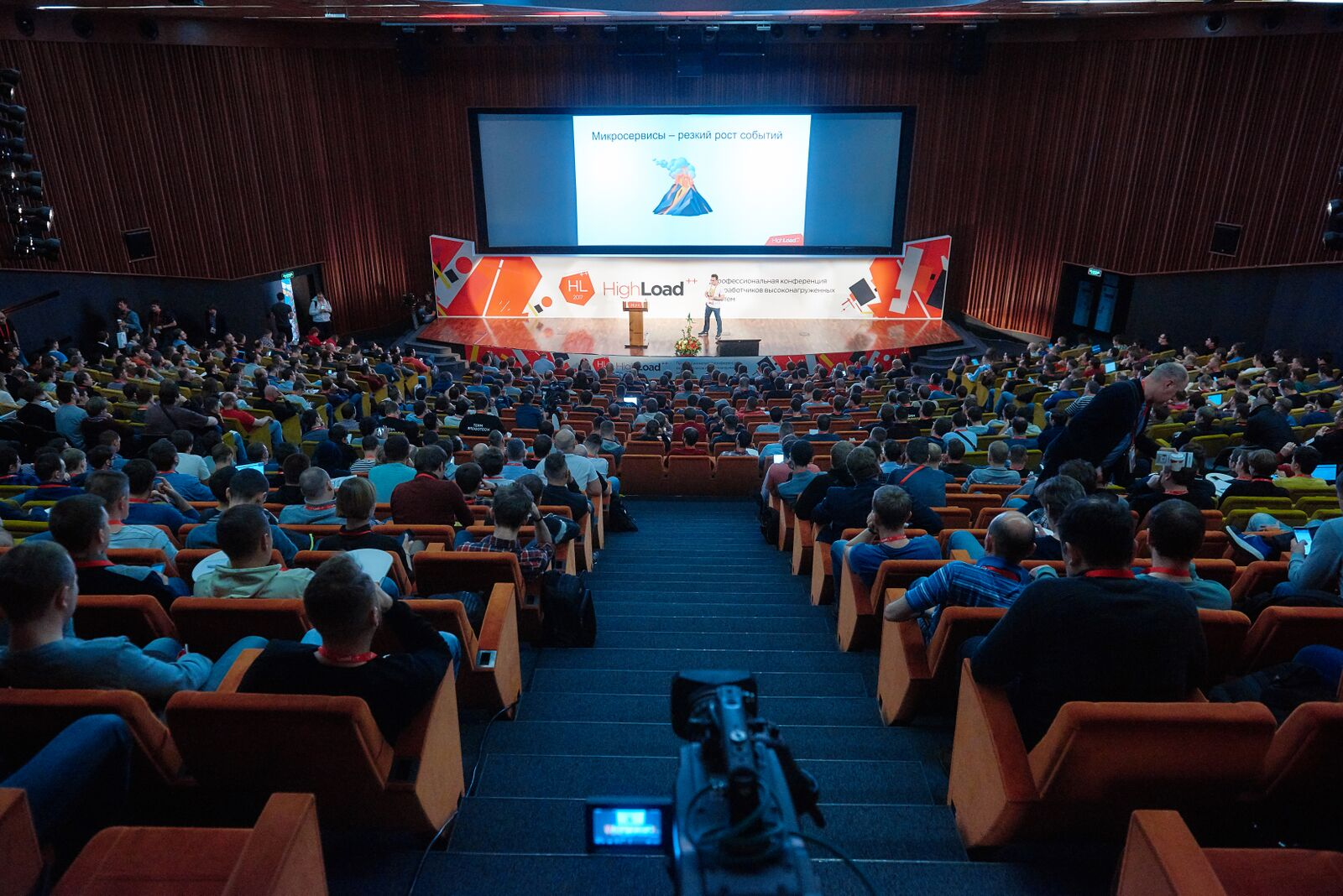
In the schedule of 138 reports of the main program, 14 two-hour master classes and an uncountable number of mitaps (in the sense that they will be added along the way, and we can count them only after the fact). On the one hand, it all means that everyone will find topics for themselves and will be able to get answers to their questions. On the other hand, it is very difficult to choose.
')
One of the route options for the conference is to go on all the most popular reports . Moreover, while working on the schedule, we interviewed future students and made a rating of expectations. The leaders of the voting will speak in the Main Hall (Congress Hall), which, according to a good tradition, we broadcast for free .
The broadcast will go to our HighLoad Channel on youtube, so as not to forget and not to miss, you can subscribe to the channel, blog or newsletter - but rather all at once, we have everything useful :)
And now let's learn what, strictly speaking, is now in a trend, and what everyone wants to hear about or whom.
November 8
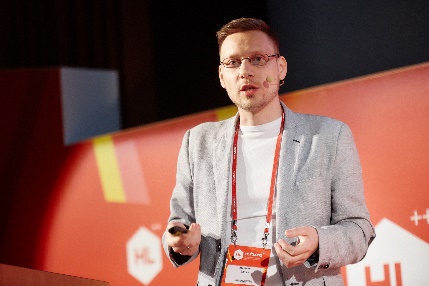 Vadim will talk about which metrics to collect from microservices at different stages, and share his experience of using these metrics to check production status. In general, let's talk about everything called “life after launch in Kubernetes”.
Vadim will talk about which metrics to collect from microservices at different stages, and share his experience of using these metrics to check production status. In general, let's talk about everything called “life after launch in Kubernetes”.
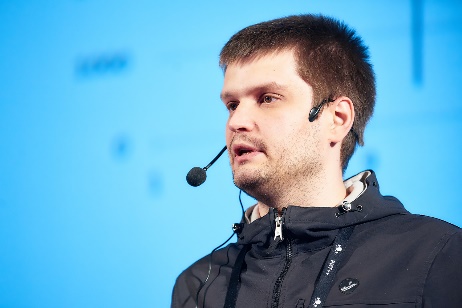 Ivan will show the evolution of private clouds in Booking.com, will tell on which technologies different generations were built. Let us see how the implementation of containerized applications and SOA forced the restructuring of internal processes and, starting as a small project, eventually turned into something much larger.
Ivan will show the evolution of private clouds in Booking.com, will tell on which technologies different generations were built. Let us see how the implementation of containerized applications and SOA forced the restructuring of internal processes and, starting as a small project, eventually turned into something much larger.
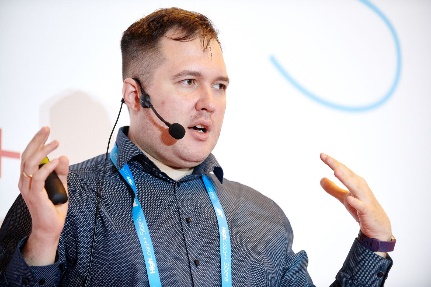 Nikolai offers to get acquainted with the concept of “Remembering Fabric”, Persistence Fabric, which will help solve a lot of microservice architecture problems with separate databases for different services. In the report we will talk about the elements of its implementation on the graphical DBMS Neo4J.
Nikolai offers to get acquainted with the concept of “Remembering Fabric”, Persistence Fabric, which will help solve a lot of microservice architecture problems with separate databases for different services. In the report we will talk about the elements of its implementation on the graphical DBMS Neo4J.
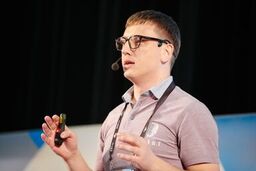 Dmitry will finally tell whether the base in Kubernetes is possible. With specific examples, we will consider when it makes sense to place databases (and generally stateful applications) in Kubernetes, and in which it is unjustified or even harmful and dangerous.
Dmitry will finally tell whether the base in Kubernetes is possible. With specific examples, we will consider when it makes sense to place databases (and generally stateful applications) in Kubernetes, and in which it is unjustified or even harmful and dangerous.
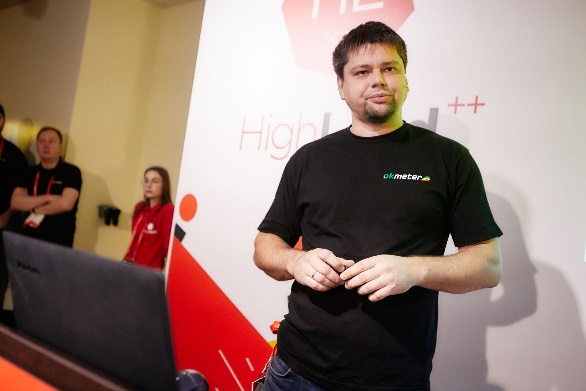 Nikolai will share his experience in the development and operation of specialized database timeseries, which are based on Apache Kafka. The main benefit is how you can NOT implement some of the most complex logic for a given task, but take it from Apache Kafka: do not do replication yourself; get sharding out of the box; maintain / control data integrity.
Nikolai will share his experience in the development and operation of specialized database timeseries, which are based on Apache Kafka. The main benefit is how you can NOT implement some of the most complex logic for a given task, but take it from Apache Kafka: do not do replication yourself; get sharding out of the box; maintain / control data integrity.
Alexander will share his experience of changing the technological stack in the event processing system from Spark + Hadoop to ClickHouse. The experience is useful - it allowed saving iron three times and increasing the load five times.
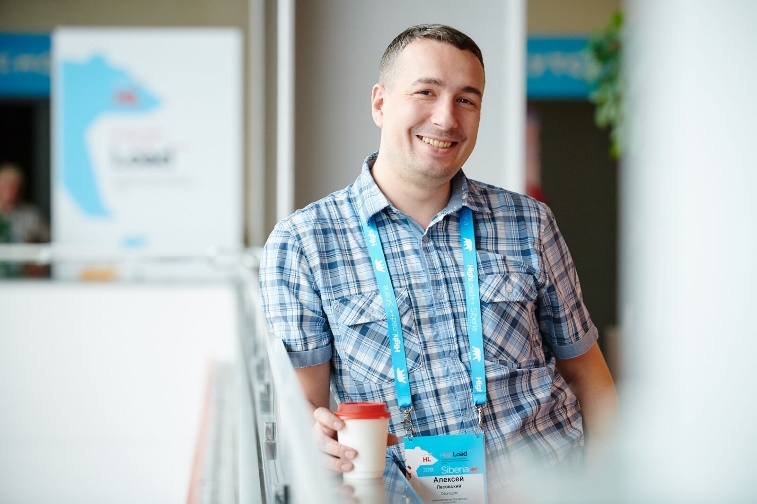 Alexey in his speech, Alexey promises to make out the situations that development teams see as the solution to their tasks, and DBA - as a source of potential problems. This report will be useful to an extremely wide range of technicians involved in software development and database maintenance.
Alexey in his speech, Alexey promises to make out the situations that development teams see as the solution to their tasks, and DBA - as a source of potential problems. This report will be useful to an extremely wide range of technicians involved in software development and database maintenance.
The last report of the first day is devoted to the theme of the development board. Anton will talk about the organization of the infrastructure team and share experiences about the nuances and risks that should be taken into account. We will see how to increase team efficiency, retaining the same number of people, and how to strengthen business confidence.
And after the reports, the time of the evening program is coming - this is an important networking that you will not get through the broadcast. But here's the highlight of the program - the HighLoad ++ Award - everyone will be able to see!
November 9
Vladimir creates conditions for developers who like to write tests very much. Consider the entire arsenal of tools available to the Badoo developer for quick and easy writing of tests. Let's discuss what problems may arise, and how to combine and use the tools to support such a number of tests.
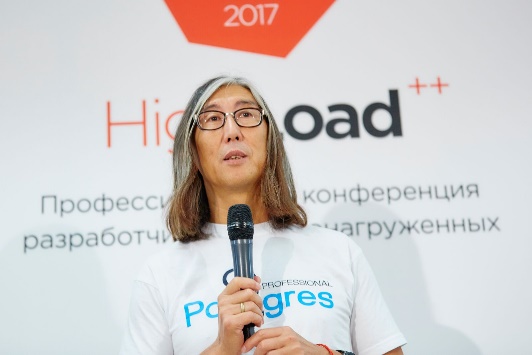
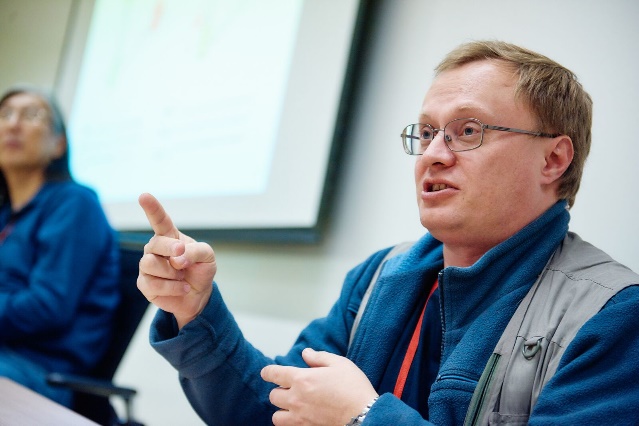 Oleg and Fedor believe that in most cases the so-called “highload” is a signal that something is conceived or done incorrectly. The report will look at typical errors of architects, application developers, and database administrators, which lead to unreasonably high workloads. In addition, of course, we’ll focus on the intricacies of PostgreSQL advanced features.
Oleg and Fedor believe that in most cases the so-called “highload” is a signal that something is conceived or done incorrectly. The report will look at typical errors of architects, application developers, and database administrators, which lead to unreasonably high workloads. In addition, of course, we’ll focus on the intricacies of PostgreSQL advanced features.
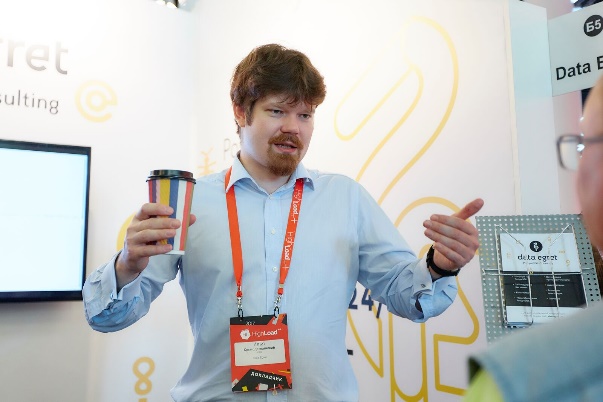 Ilya approaches the issue of self-development systematically, and will teach us. Starting with what books must be read, ending with how to look for answers to questions that are not in the books and never will be. Let's go through the list of theoretical knowledge that modern basist needs, let's see how to maintain them up to date. And we will do the same with practical skills.
Ilya approaches the issue of self-development systematically, and will teach us. Starting with what books must be read, ending with how to look for answers to questions that are not in the books and never will be. Let's go through the list of theoretical knowledge that modern basist needs, let's see how to maintain them up to date. And we will do the same with practical skills.
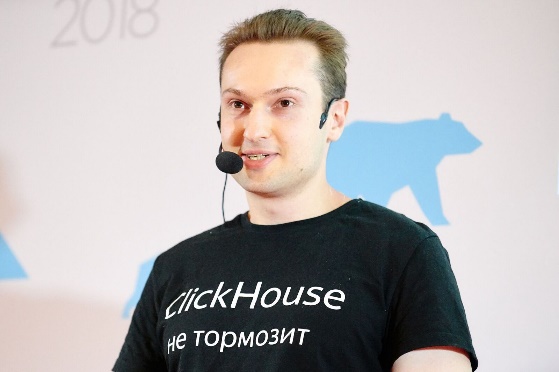 From whom to find out about the requests in ClickHouse, as not from the developer ClickHouse. Alexey will demonstrate the built-in capabilities of query performance introspection in ClickHouse and the opportunities provided by the operating system, which everyone should be aware of.
From whom to find out about the requests in ClickHouse, as not from the developer ClickHouse. Alexey will demonstrate the built-in capabilities of query performance introspection in ClickHouse and the opportunities provided by the operating system, which everyone should be aware of.
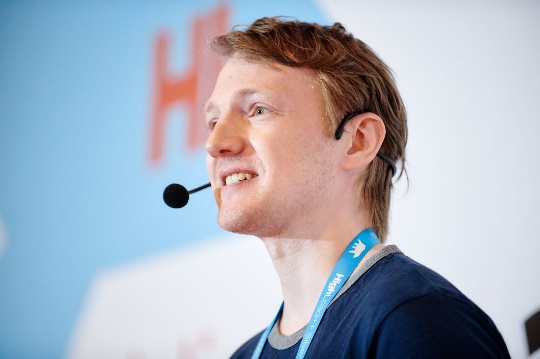 Yuri will explain in detail why VK needs ClickHouse, how much data is stored, and much more. Let's go through the points: statistics collection, cluster configuration, buffer tables, operational problems, local proxy for ClickHouse.
Yuri will explain in detail why VK needs ClickHouse, how much data is stored, and much more. Let's go through the points: statistics collection, cluster configuration, buffer tables, operational problems, local proxy for ClickHouse.
The health of people whom this system can wake at night depends on the work of the system of notification of abnormal situations. When you develop an alert system, you need to make decisions that are at the intersection of development, administration and design (in a good sense of each of these words). This is what Alexey plans to talk about at HighLoad ++.
Together with Alexey on his report, we will trace the entire path of the request from the user to the Dropbox application servers. Let's look at external DNS / BGP balancing, device of points of presence all over the world, traffic inside the data center, traffic between microservices of the backend.

In the schedule of 138 reports of the main program, 14 two-hour master classes and an uncountable number of mitaps (in the sense that they will be added along the way, and we can count them only after the fact). On the one hand, it all means that everyone will find topics for themselves and will be able to get answers to their questions. On the other hand, it is very difficult to choose.
')
One of the route options for the conference is to go on all the most popular reports . Moreover, while working on the schedule, we interviewed future students and made a rating of expectations. The leaders of the voting will speak in the Main Hall (Congress Hall), which, according to a good tradition, we broadcast for free .
Broadcast first day HighLoad ++
Broadcast of the second day HighLoad ++
The broadcast will go to our HighLoad Channel on youtube, so as not to forget and not to miss, you can subscribe to the channel, blog or newsletter - but rather all at once, we have everything useful :)
And now let's learn what, strictly speaking, is now in a trend, and what everyone wants to hear about or whom.
November 8
10:00 - What do we know about microservices? / Vadim Madison (Avito)
 Vadim will talk about which metrics to collect from microservices at different stages, and share his experience of using these metrics to check production status. In general, let's talk about everything called “life after launch in Kubernetes”.
Vadim will talk about which metrics to collect from microservices at different stages, and share his experience of using these metrics to check production status. In general, let's talk about everything called “life after launch in Kubernetes”. 11:00 - Thorns of containerized applications and microservices / Ivan Kruglov (Booking.com)
 Ivan will show the evolution of private clouds in Booking.com, will tell on which technologies different generations were built. Let us see how the implementation of containerized applications and SOA forced the restructuring of internal processes and, starting as a small project, eventually turned into something much larger.
Ivan will show the evolution of private clouds in Booking.com, will tell on which technologies different generations were built. Let us see how the implementation of containerized applications and SOA forced the restructuring of internal processes and, starting as a small project, eventually turned into something much larger.12:00 - Data Discovery in microservice architecture / Nikolay Golov (Avito)
 Nikolai offers to get acquainted with the concept of “Remembering Fabric”, Persistence Fabric, which will help solve a lot of microservice architecture problems with separate databases for different services. In the report we will talk about the elements of its implementation on the graphical DBMS Neo4J.
Nikolai offers to get acquainted with the concept of “Remembering Fabric”, Persistence Fabric, which will help solve a lot of microservice architecture problems with separate databases for different services. In the report we will talk about the elements of its implementation on the graphical DBMS Neo4J.13:00 - Databases and Kubernetes / Dmitry Stolyarov (Fant)
 Dmitry will finally tell whether the base in Kubernetes is possible. With specific examples, we will consider when it makes sense to place databases (and generally stateful applications) in Kubernetes, and in which it is unjustified or even harmful and dangerous.
Dmitry will finally tell whether the base in Kubernetes is possible. With specific examples, we will consider when it makes sense to place databases (and generally stateful applications) in Kubernetes, and in which it is unjustified or even harmful and dangerous.14:00 - Apache Kafka as a basis for cycling / Nikolay Sivko (okmeter.io)
 Nikolai will share his experience in the development and operation of specialized database timeseries, which are based on Apache Kafka. The main benefit is how you can NOT implement some of the most complex logic for a given task, but take it from Apache Kafka: do not do replication yourself; get sharding out of the box; maintain / control data integrity.
Nikolai will share his experience in the development and operation of specialized database timeseries, which are based on Apache Kafka. The main benefit is how you can NOT implement some of the most complex logic for a given task, but take it from Apache Kafka: do not do replication yourself; get sharding out of the box; maintain / control data integrity.15:00 - Overclock event handling up to 1.6 M / s / Alexander Krasheninnikov (Badoo)
Alexander will share his experience of changing the technological stack in the event processing system from Spark + Hadoop to ClickHouse. The experience is useful - it allowed saving iron three times and increasing the load five times.
16:00 - Top errors from the development side when working with PostgreSQL / Alexey Lesovsky (Data Egret)
 Alexey in his speech, Alexey promises to make out the situations that development teams see as the solution to their tasks, and DBA - as a source of potential problems. This report will be useful to an extremely wide range of technicians involved in software development and database maintenance.
Alexey in his speech, Alexey promises to make out the situations that development teams see as the solution to their tasks, and DBA - as a source of potential problems. This report will be useful to an extremely wide range of technicians involved in software development and database maintenance.17:00 - “Platform” in Badoo: how we built the infrastructure development / Anton Povarov (Badoo)
The last report of the first day is devoted to the theme of the development board. Anton will talk about the organization of the infrastructure team and share experiences about the nuances and risks that should be taken into account. We will see how to increase team efficiency, retaining the same number of people, and how to strengthen business confidence.
And after the reports, the time of the evening program is coming - this is an important networking that you will not get through the broadcast. But here's the highlight of the program - the HighLoad ++ Award - everyone will be able to see!
We went a long way towards this and were finally pleased to announce the Prize for the contribution to the development of the Internet development ecosystem in Russia. For the first time, we will present the HighLoad Award ++ to professionals who have had a profound positive effect on the development of the Internet development ecosystem in Russia.
This is thanks to the community of professionals for their leaders. For work and dedication, for sleepless nights and countless performances, for believing in your product or technology. We thank you for making us stronger, our sites faster, and our work easier and more productive!
November 9
11:00 - Monolith for hundreds of client versions: how we write and support tests / Vladimir Yants (Badoo)
Vladimir creates conditions for developers who like to write tests very much. Consider the entire arsenal of tools available to the Badoo developer for quick and easy writing of tests. Let's discuss what problems may arise, and how to combine and use the tools to support such a number of tests.
12:00 - How to arrange a hayload on level ground / Oleg Bartunov and Fedor Sigaev (Postgres Professional)

 Oleg and Fedor believe that in most cases the so-called “highload” is a signal that something is conceived or done incorrectly. The report will look at typical errors of architects, application developers, and database administrators, which lead to unreasonably high workloads. In addition, of course, we’ll focus on the intricacies of PostgreSQL advanced features.
Oleg and Fedor believe that in most cases the so-called “highload” is a signal that something is conceived or done incorrectly. The report will look at typical errors of architects, application developers, and database administrators, which lead to unreasonably high workloads. In addition, of course, we’ll focus on the intricacies of PostgreSQL advanced features.13:00 - How to become a cool database specialist? / Ilya Kosmodemyansky (Data Egret)
 Ilya approaches the issue of self-development systematically, and will teach us. Starting with what books must be read, ending with how to look for answers to questions that are not in the books and never will be. Let's go through the list of theoretical knowledge that modern basist needs, let's see how to maintain them up to date. And we will do the same with practical skills.
Ilya approaches the issue of self-development systematically, and will teach us. Starting with what books must be read, ending with how to look for answers to questions that are not in the books and never will be. Let's go through the list of theoretical knowledge that modern basist needs, let's see how to maintain them up to date. And we will do the same with practical skills.14:00 - Performance analysis of queries in ClickHouse / Alexey Milovidov (Yandex)
 From whom to find out about the requests in ClickHouse, as not from the developer ClickHouse. Alexey will demonstrate the built-in capabilities of query performance introspection in ClickHouse and the opportunities provided by the operating system, which everyone should be aware of.
From whom to find out about the requests in ClickHouse, as not from the developer ClickHouse. Alexey will demonstrate the built-in capabilities of query performance introspection in ClickHouse and the opportunities provided by the operating system, which everyone should be aware of.15:00 - How VK inserts data into ClickHouse from tens of thousands of servers / Yuri Nasretdinov (VK)
 Yuri will explain in detail why VK needs ClickHouse, how much data is stored, and much more. Let's go through the points: statistics collection, cluster configuration, buffer tables, operational problems, local proxy for ClickHouse.
Yuri will explain in detail why VK needs ClickHouse, how much data is stored, and much more. Let's go through the points: statistics collection, cluster configuration, buffer tables, operational problems, local proxy for ClickHouse.16:00 - What we have learned while making our own system of notification of emergency situations / Alexey Kirpichnikov (Contour)
The health of people whom this system can wake at night depends on the work of the system of notification of abnormal situations. When you develop an alert system, you need to make decisions that are at the intersection of development, administration and design (in a good sense of each of these words). This is what Alexey plans to talk about at HighLoad ++.
17:00 - Traffic infrastructure Dropbox / Alexey Ivanov (Dropbox)
Together with Alexey on his report, we will trace the entire path of the request from the user to the Dropbox application servers. Let's look at external DNS / BGP balancing, device of points of presence all over the world, traffic inside the data center, traffic between microservices of the backend.
We can hardly offer you a personal visit, SKOLKOVO was not stretchable and will not be able to accommodate more than 3,000 people. But the broadcast is quite - watch for free air or purchase the full broadcast of all reports.
Source: https://habr.com/ru/post/428852/
All Articles